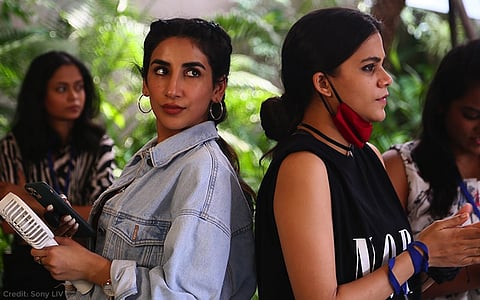
- In-Depth Stories
- Web Stories
- Reviews
- News
- FC Lists
- Interviews
- Features
- FC SpecialsFC Specials

Director: Chaitanya Kumbhakonam
Writer: Shreyasi Sharma, Anant Singh 'Bhaatu', Prashant Kumar, Swasti Jain
Cast: Srishti Shrivastava, Ahsaas Channa, Parul Gulati, Shreya Mehta, Gagan Arora, Simran Natekar, Trupti Khamkar, Jayati Bhatia
Producer: Arunabh Kumar
Streaming Platform: SonyLIV
TVF shows swim in that sweet spot of being both aspirational and relatable—where a college looks like the brick-and-mortar college many of us have gone to, that a workplace looks like the isolating cubicles most of us will work in. And yet, within that familiar, relatable context they infuse an aspirational quality—of rising above these circumstances while still being tethered to it. No one gives up on college and becomes a writer. No one leaves their cubicle job and becomes a standup comedian. And yet, there is success in their lives—unradical, and contained. But by no means is it "realistic", with the veneer of beauty and buddies, however contained. These shows are also immensely watchable, and brief, to boot.
The first season of Girls Hostel by Girliyappa, a subsidiary of TVF, is on Netflix. The second season, by TVF, released on SonyLIV. (You can watch the second season without having watched the first, the context is more-or-less set up.) Set in SVM University, Pune, about a group of girls studying dentistry, living at the hostel, both seasons are directed by Chaitanya Kumbhakonam. Both seasons also have 5 half-hour episodes, with one "big" question that trails each season. In the first season, it is to uncover the history behind the enmity between the goth, and cool Jo (Srishti Shrivastava) and the popular with hair-highlights Zahira (Parul Gulati), an enmity that came from a deeply wounded friendship. The stock villain in this story is Ramya (Shreya Mehta), a medical student who wedges this friendship. In the second season Zahira runs for student body president against Ramya.
The undercurrent is that of Medical > Dentistry, much like the Science > Commerce hegemony. The show doesn't necessarily tackle this hegemony by providing corrective monologues. In fact, it even gives leeway, a little, to stereotypes, like that of biology students being weak at math. Even in the first season, when we are first introduced to Richa (Ahsaas Channa), the sweet, sincere, but not entirely central character, she is frank about her doing dentistry because she landed 3 points below the medical cut-off. The show finds no need to be paradigm shifting. It is, to its credit, content with sweetness.
But it does try to push the "messaging" button— Jo's name is actually Anandibai Joshi, the first female practitioner of Western medicine in India, and Jo uses her comebacks to speak of Faiz and taraqqi-pasandi. It jars, even as it is self-aware, on-lookers noting how she converses only in comebacks. But a lot of these dialogues are not sharp as they should have been, and their intended wit feels too performed, almost as if the actors were uncomfortable mouthing them. Words like "revolution" and "non-cooperation movement" are used without the intended impact of it. The election speeches are flat, the evil and the virtue too fizzled. A closer look at the script before and on the set, while being enacted, might have ironed out these creases. There is a very obvious sense of it being shot in haste.

The second season begins with the dentistry girls hostel being shifted, with water and space problems in their new abode. Much of the brief season takes place here—with drunk boys jumping in to take photos and videos, and boys being snuck in for a casual party. But boys themselves are only peripheral to this story.

The girls locker-room is a fascinating space, because it's usually spoken of in opposition to the boys locker-room, and never as its own entity. Here, it's the other way round. The centrality of the feminine space is quite refreshing, even as it is tackled with light humour—the used pads that are kept around (Pushpavalli took this to riotous laughter with Vasu), the use of conditioner, and water for skincare. The sheltered Gujarati girl is suddenly likened to Mia Khalifa, and the conversation isn't about being cheapened, but about agency. The warden (Trupti Khamkar) has Big Vasu Energy, but grows less brittle and more supportive as the season progresses. The other older woman in the show is Dean Sarla Devi (Jayati Bhatia), who also is as exacting as yielding. The fact that the younger polemical, extreme characterizations give way to more morally ambiguous but vaguely rooted older characters is another quiet subtext. To be young is to feel. To be old is to feel contextually.